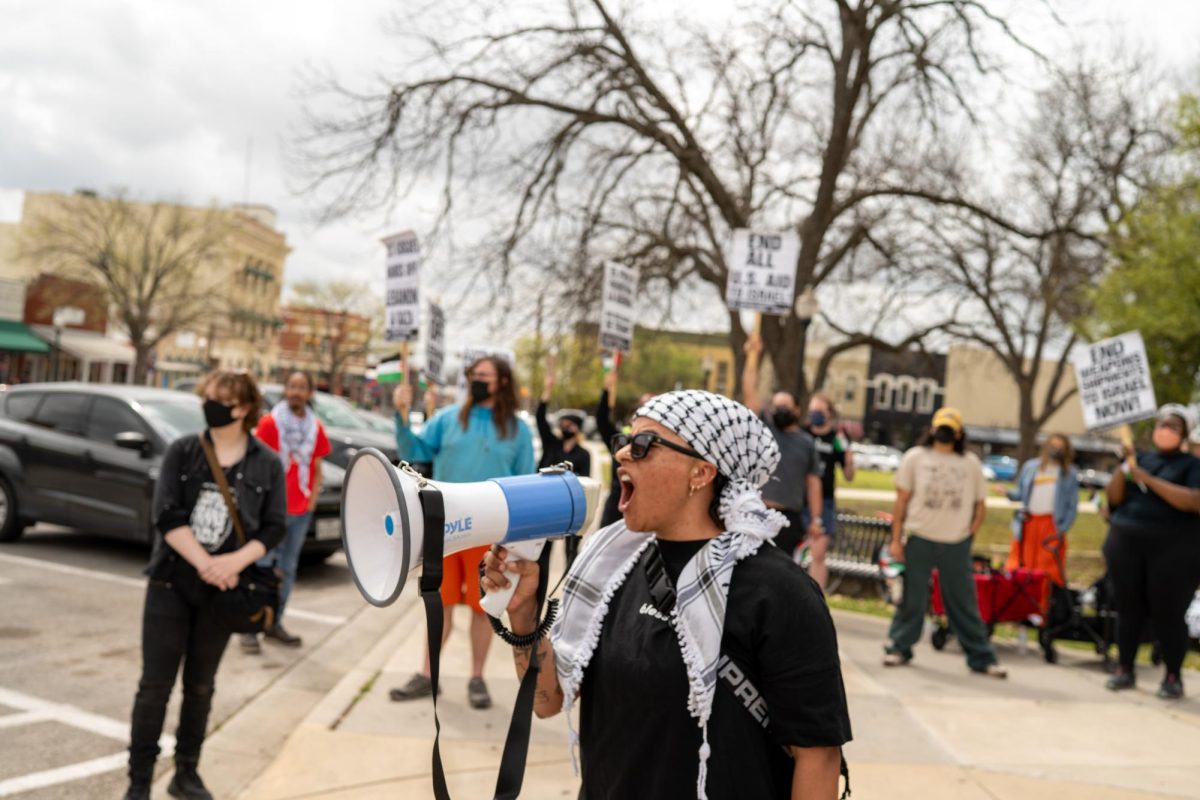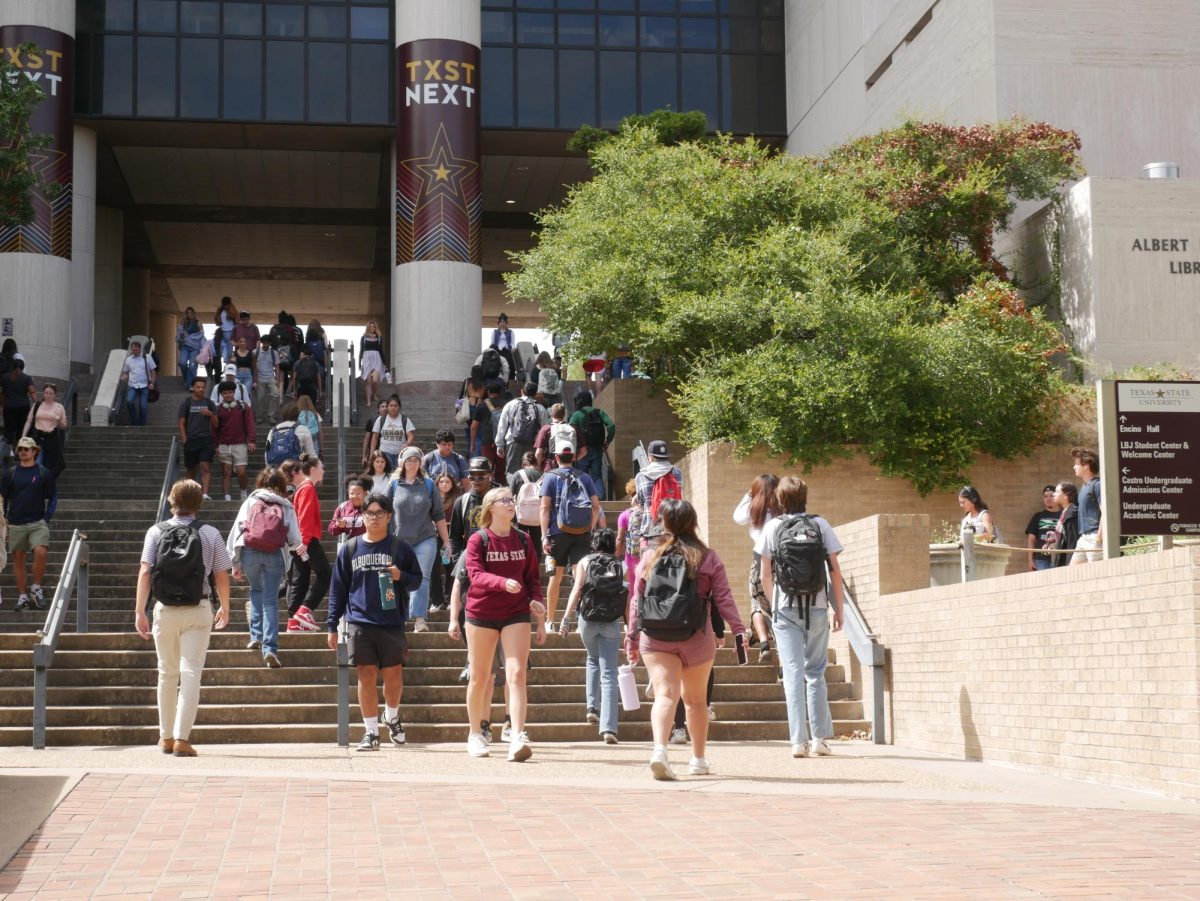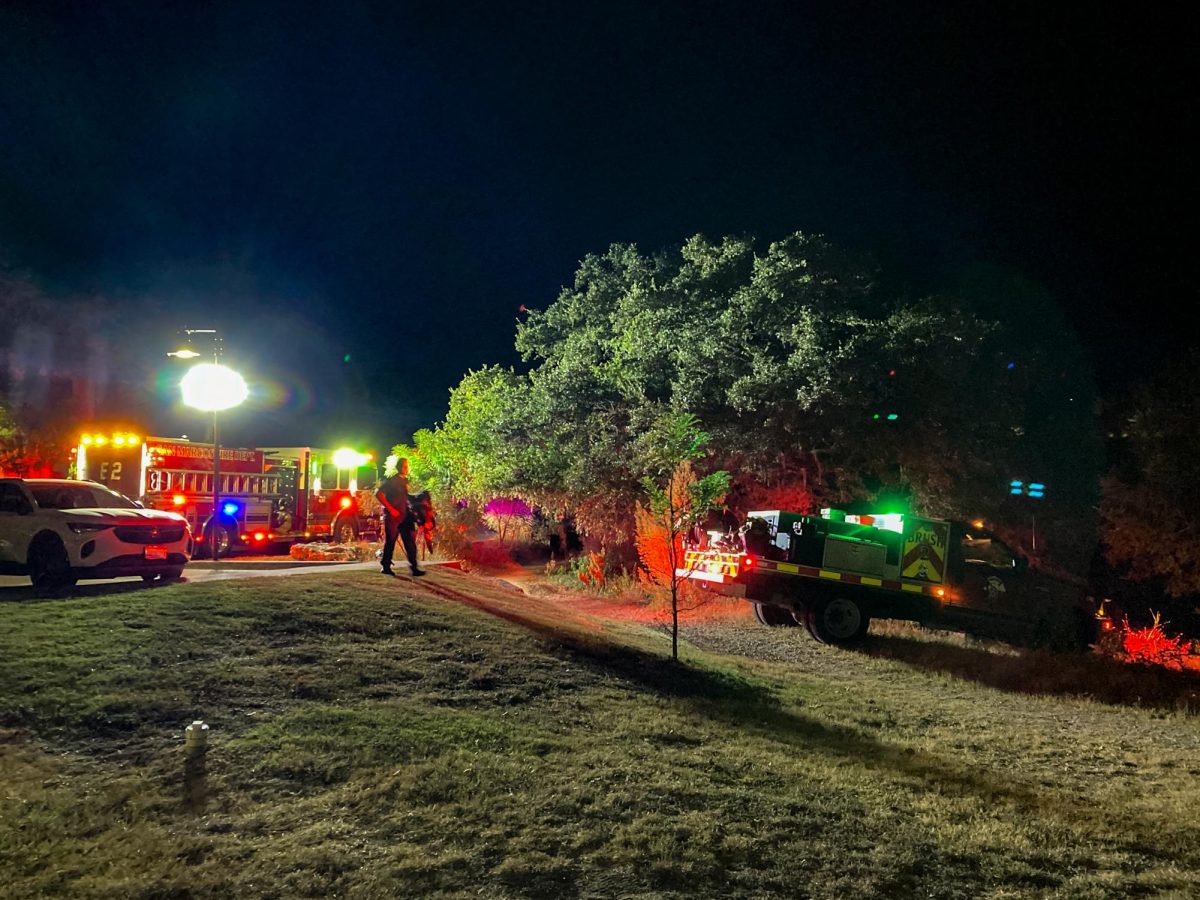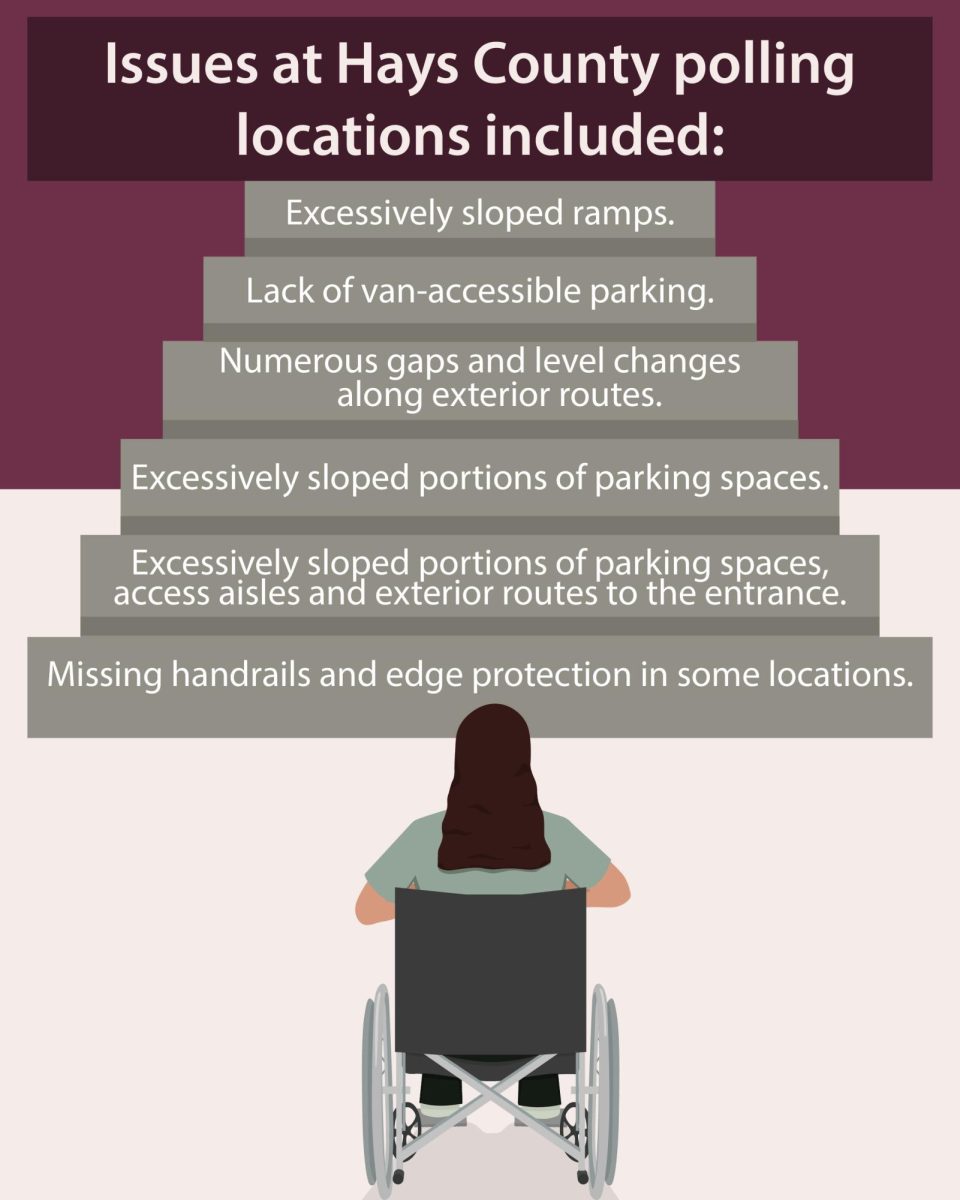Editor’s note: the current Resident Assistant (RA) in this story has requested to stay anonymous as they still work for the Department of Housing and Residential Life and do not want to risk losing their job.
Current and former RAs are speaking out against the Department of Housing and Residential Life’s (DHRL) media policy, arguing it restricts their First Amendment rights of free speech and expression.
As of Sept. 9, 22 RAs were once again required to live with freshmen roommates due to overcrowding in on-campus housing.
[DHRL] does not want anyone to know that we’re so over capacity,” a current RA said. “On the inside [of the department], it is so chaotic. I’ve not been at the upper levels of management within the department, but just from a person [at the bottom of the] pyramid, it is so chaotic.
Some RAs at Texas State feel they do not have freedom of speech to speak out or speak to the media about issues they face in their capacity at DHRL, according to the RA.
“[DHRL] just basically looks over what you said and sees how bad it is basically and determine from there,” the RA said. “You would either be fired or just, I guess put on probation forever, but most likely fired from what I remember.”
The University Star asked for all training materials and presentations used by the DHRL for RAs in a public information request.
Section 04.01, “Procedures for Responding to Media Inquiries,” states university personnel should “notify their supervisor or the director of the [Office of Media Relations] or the [Associate Vice President] for University Advancement Communications. As long as time factors are taken into consideration, it is permissible to take a phone number, ask what topic will be covered and immediately return a call or email. This allows the person queried the opportunity to seek advice.”
The policy also states, “when an employee of the university gives a personal opinion on the subject, they should make certain that the reporter understands that they are speaking for themselves, not for the university.”
However, the UPPS never states an explicit policy where requests for media interviews must be approved by their supervisor, only that personnel should notify their supervisor.
In a statement to The University Star, a Texas State University Spokesperson wrote, “per university policy, TXST employees must notify their supervisor before engaging with representatives of the media regarding inquiries into matters pertaining to the university.”
Bill Mattera, executive director of DHRL, said the department does not dictate RAs’ speech as students, but there are parameters an employee has to follow when speaking to the media.
“I’m a full-time employee, I have speech rights, and I could talk to [the media] tomorrow as Bill Mattera, but as Bill Mattera, executive director of housing, I’m going to run that through media relations,” Mattera said. “If you just leave off [the title of] resident assistant when media identifies them in their story, there’s no question that they’re [speaking] as a private citizen.”
According to Foundation for Individual Rights and Expression (FIRE) Program Officer for Campus Rights Advocacy Dominic Coletti, speaking with a title does not mean an employee is speaking on behalf of their employer.
“[DHRL is] applying this [policy] to interactions with the media that are just about an RA’s personal experiences where they talk about what they feel about the issues of the day, not what the university feels, and that is absolutely prescribed by the First Amendment,” Coletti said. “When [RAs are] speaking to the media about an issue of…a matter of public concern…, they don’t surrender the right to speak on those issues just because they happen to work for the government.”
The RA said DHRL explained the policy as RAs can speak to the media as students without a title, but if it relates to the department, their capacity as an RA or if they use their RA title, they could be disciplined.
The RA said they felt if they were to talk to the media using their name, it could lead to them getting fired.
“Full stop, yes, I do think I would be fired,” the RA said. “There’s more applicants, so if I got fired, it would be pretty easy to hire someone else.”
DHRL trains RAs to avoid speaking to the media, according to the RA.
“[DHRL will say] ‘the media will take your words out of context, and they will twist things’,” the RA said.
In the media training materials for RAs, the “Support Freedom of Speech” slide states RAs should “clarify when you are speaking only as an individual and not utilizing your title or employment status.”
Coletti said as Texas State is a public university, the administration cannot restrict the speech of its employees in their capacity as citizens, regardless of if they use their employment title, as it violates the First Amendment.
“Employees of the government don’t surrender their right to speak to citizens on matters of public concern, and that especially extends to speech about their employer,” Coletti said. “Any policy that prohibits RAs from speaking as citizens on these issues of public concerns would be unconstitutional.”
Former RA and Texas State alumna Tabby Keep said she did not feel like she had freedom of speech in her capacity as an RA.
“As long as [DHRL] didn’t hear about it, I had freedom of speech,” Keep said. “[There was a] mentality of not wanting anything to slip. It felt like the only information they wanted to be released about them was by them.”
For RAs, getting fired does not just mean losing their job – it also means losing their housing.
Former RA and Texas State alumna Regina Macias said she and a few other RAs tried to form a student union in 2022, but most RAs did not want their names to be associated out of fear of being fired.
“I go to school there, I eat there, I live there,” Macias said. “I [didn’t] want to put myself in a position where I could lose my housing and my source of income.”
The University Star released a story reporting RAs were being silenced by the DHRL’s media policy in 2018, which stated RAs could not speak to the media unless the request was approved by the department.
In the article, a DHRL representative said the department would work on creating an RA addendum that would allow all RAs to review and sign on to a revised media policy. However, DHRL’s media policy for RAs did not change, and an addendum was never created for a media policy.
In 2022, an opinion piece written by former RA Andrew Hodge ran in The University Star, arguing Texas State did not have the on-campus housing capacity to support the number of freshmen it was admitting.
Three RAs at the time, including Macias, were quoted in the story discussing how they had been affected by the influx of students at Texas State, particularly through having freshmen roommates.
After the story was published, all four RAs were required to attend “fact-finding meetings” with their supervisors to determine whether the RAs violated Texas State policy.
During the meetings, each of the RAs were asked numerous questions, including if they were aware that they would be identified in the article as a representative of DHRL.
Macias said she told DHRL that she did not speak to The Star as a representative of DHRL, but for herself as an RA.
After the meetings concluded, the three RAs who were quoted in the article received written warnings and were put on probation.
“I got an email saying I’m on probation, which the way the structure works is you do one more thing, you’re out basically,” Macias said.
This prompted Macias to reach out to FIRE, a free speech advocacy and legal defense group, who intervened on the RAs’ behalf by sending a letter to Texas State encouraging the school to rescind the written warnings and modify their media policy that bans RAs from “speaking as private citizens on matters of public concern.”
“RAs have a First Amendment right to publicly raise concerns about a university’s admissions policies, their workplace conditions or other important issues on campus,” James Jordan, FIRE litigation and campus advocacy fellow, wrote.
In January 2023, Texas State rescinded the three RAs’ written warnings and said they were committed to protecting free speech on campus.
Macias said the department held their spring 2023 RA training and reaffirmed the media policy after previously committing to protecting free speech on campus.
“We had our usual training of ‘don’t speak to the media, don’t speak to the press [because] they like to twist things’,” Macias said. “It’s not on the contract, but the policies still remain the same.”
Keep said in her time at the DHRL, the overall unspoken policy was to not make DHRL look bad and to not talk about anything related to DHRL.
After Keep graduated, she said she did not realize how suppressive the DHRL felt until she started a new job.
“Anytime censorship is in place, it’s because something shifty is going on,” Keep said. “It’s highlighted too with the fact those three RAs got [put on] probation, and then as soon as somebody pointed it out, [DHRL] is like, ‘oh, right, we can’t do that,’ without actually changing anything. [Instead] it’s, ‘Let’s hope this doesn’t happen again, and somebody doesn’t rat us out for violating First Amendment rights.’”
While Texas State can restrict speech of employees if they are speaking as the university’s official position, Coletti said Texas State does not have the ability as a public institution to restrict speech of personnel or require approval to participate in a media interview.
“If the position that Texas State wants to take is that the media likes to twist things, then that’s very disheartening to hear from a school like that, and it definitely doesn’t bode well for the culture of freedom of expression,” Coletti said.





















